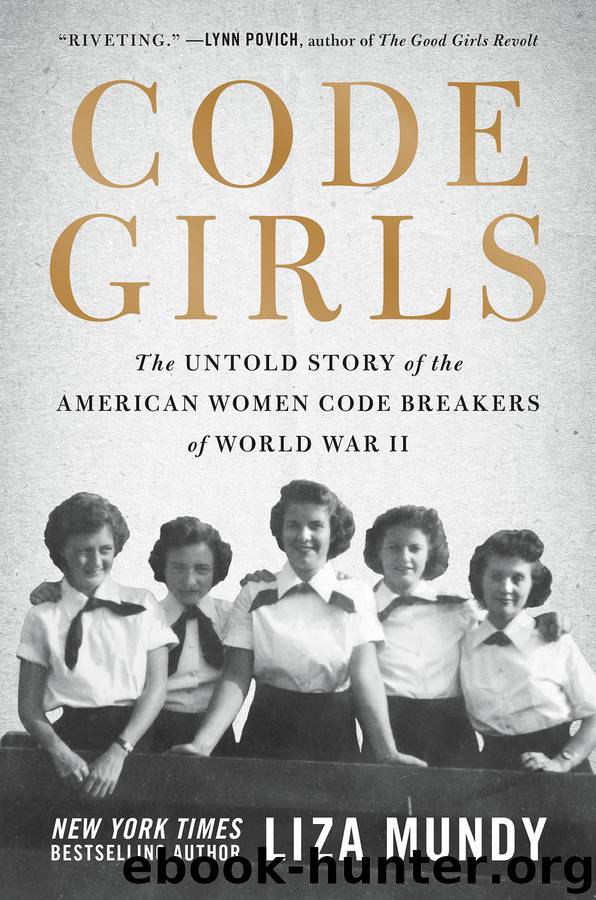Code Girls by Liza Mundy

Author:Liza Mundy
Language: eng
Format: epub, mobi
Tags: History / Military / World War Ii, History / Women, Political Science / Intelligence & Espionage, History / United States / 20th Century, Technology & Engineering / Military Science
Publisher: Hachette Books
Published: 2017-10-10T04:00:00+00:00
During 1942 the U.S. Army and Navy had hammered out a sane division of code-breaking duties, abandoning the odd-even rivalry dating back to the Purple break. The U.S. Navy took responsibility for breaking Japanese naval codes as well as helping with the German naval Enigma. Swamped by the demands of these major enemy systems, the Navy ceded to the U.S. Army responsibility for keeping up with Purple, as well as the codes and ciphers of many enemy and neutral nations. But the Army’s toughest assignment was breaking a fiendish tangle of Imperial Japanese Army codes, which were separate from those of the Imperial Japanese Navy and—this long into the war—remained unbroken. Tackling them was a monumental task, one that for some time appeared beyond even William Friedman’s talented and experienced group.
Part of the problem, at first, had been a lack of message traffic. Prior to the war, the Imperial Japanese Army had some 2 million troops stationed in China and on the Manchurian border, but these units were close enough in proximity that they could use low-frequency, low-power transmissions, and the U.S. Army had a hard time getting radio intercepts. To break a complex enciphered code like the ones used by the Japanese military, it’s essential to have what’s known as “depth”: lots and lots of intercepted messages that can be lined up and compared. In the panicked atmosphere after Pearl Harbor, the group made a stab at a solution nonetheless. In 1941, a British colleague brought some Japanese Army intercepts to Friedman’s operation in the old Munitions Building. Friedman shut four of his staffers—Solomon Kullback, Wilma Berryman, Delia Taylor, and Abraham Sinkov—in a room, telling them not to emerge until they had broken something. The job was just too big. After about three months, Solomon Kullback stood up and shoved his desk back into the German section. “I’ve had it,” he said. The only positive outcome was that Delia Taylor and Abe Sinkov fell in love, got married, and moved into a houseboat at the wharf. Other than that, the first attempt was dispiriting and the winter of 1942 was a gloomy one.
In many ways, however, great success was the Japanese Army’s great undoing. After its stunning victories in the first half of 1942, the Japanese Army began to spread out. Millions more troops now occupied a greatly enlarged amount of territory. Japanese units fanned out over Asia and the Pacific archipelagos: China, Hong Kong, the Philippines, Thailand, Burma, Malaya, the Dutch East Indies. The Eighth Area Army concentrated around the stronghold of Rabaul, on the island of New Britain. Each unit remained tied to its home base in Japan and was obliged to send back reports on things like casualties and the need for reinforcements. As the Japanese Army got farther from Japan, radiomen increased the power of their transmissions, and this made it much more feasible to intercept them.
Soon enough, the problem at Arlington Hall was not a dearth of intercepts. Japanese Army messages began pouring in by the tens of thousands—by airmail, by cable, by teletype.
Download
This site does not store any files on its server. We only index and link to content provided by other sites. Please contact the content providers to delete copyright contents if any and email us, we'll remove relevant links or contents immediately.
| Africa | Americas |
| Arctic & Antarctica | Asia |
| Australia & Oceania | Europe |
| Middle East | Russia |
| United States | World |
| Ancient Civilizations | Military |
| Historical Study & Educational Resources |
Cat's cradle by Kurt Vonnegut(15351)
Pimp by Iceberg Slim(14506)
4 3 2 1: A Novel by Paul Auster(12391)
Underground: A Human History of the Worlds Beneath Our Feet by Will Hunt(12097)
The Radium Girls by Kate Moore(12028)
Wiseguy by Nicholas Pileggi(5782)
The Fire Next Time by James Baldwin(5442)
Perfect Rhythm by Jae(5402)
American History Stories, Volume III (Yesterday's Classics) by Pratt Mara L(5307)
Paper Towns by Green John(5188)
Pale Blue Dot by Carl Sagan(5007)
A Higher Loyalty: Truth, Lies, and Leadership by James Comey(4960)
The Mayflower and the Pilgrims' New World by Nathaniel Philbrick(4502)
The Doomsday Machine by Daniel Ellsberg(4490)
Killers of the Flower Moon: The Osage Murders and the Birth of the FBI by David Grann(4447)
The Sympathizer by Viet Thanh Nguyen(4390)
Too Much and Not the Mood by Durga Chew-Bose(4347)
The Borden Murders by Sarah Miller(4325)
Sticky Fingers by Joe Hagan(4197)
